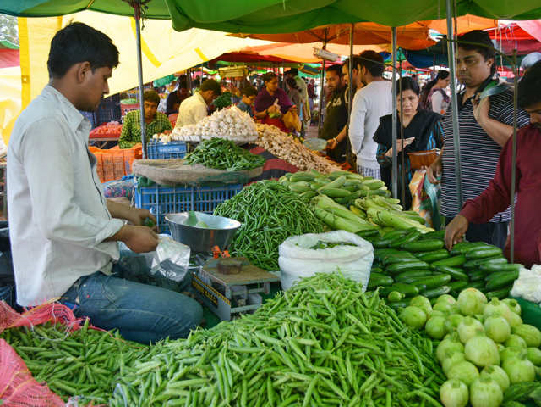
Farmgate Infrastructure Development a prelude to Enhance Economic Profile of farmers
Agriculture constitutes an important part of Indian economy and is the primary source of income in rural areas, both directly through crop production and indirectly through on- and off-farm employment in agriculture-allied industries. The importance of improving rural infrastructure cannot be overemphasized and has long been at the center of development policies across the world. The investments for development of rural infrastructure has positive effects on agricultural production and marketing.
Small and marginal farmers in India have two basic decisions to make when it comes to marketing of their crop produce – (a) sale at farmgate at low prices or (b) travelling to a market center (mandis/APMCs etc.) where higher prices are offered but transaction and transportation costs reduce their profit.
It has been generally agreed that the way forward for small and marginal farmers in agriculture-focused economies like India is better market access and participation of key stakeholders in farmgate marketing. It is also important that the orientation of policies towards improved access to market as a means of raising the economic profile of farmers need to be well defined and implemented across the country. On the other hand, the infrastructure at the farmgate need to be strengthened to include facilities for collection, storage, cold-chain, post-harvest management/processing, value addition etc., for farming to be profitable.
With this background, the creation of ₹ 1 lakh crore Agri-Infrastructure Fund (AIF) for farm- gate infrastructure development is expected to reap benefits to small and medium farmers. This fund aims to provide financing facility of ₹ 1 lakh crore for funding Agriculture Infrastructure Projects at farm-gate and aggregation points that will include primary agricultural co-operative societies, farmer producer organizations, agricultural entrepreneurs and start-ups. Though, the agricultural value chain in India is in different stages of evolution across the states, the lack of adequate cold chain and post-harvest management in the vicinity of farm-gate is a critical gap in the value chains. The focus of government till now has been on short-term crop loans and the investment in long-term agriculture infrastructure which has not been enough, hence creating AIF is a welcome shift in the policy framework.
This also gives an opportunity to private investors and venture capital firms to invest in farmgate infrastructure development either directly or through Agtech firms that will play critical roles in bridging the gaps in agri-food value chains. Though the investment in Agtech space is growing, the funding at farmgate stage has been non-existent due to lack of proper policy framework and perceived poor return on investment. The creation of AIF provides an opportunity to VCs/private investors to play an important role in strengthening the supply chain by investing in farmgate infrastructure development especially in cold-chain, post-harvest processing, value addition etc.
The strengthening of farmgate infrastructure will provide impetus to the agri-food value chains. AIF is aimed at providing small and marginal farmers with better marketing facilities closer to farmgate and improve farmer-market linkages. The fund will also help in development and upgrade of approximately 22,000 rural haats into Gramin Agricultural Markets (GrAMs) where physical infrastructure will be strengthened. Further, agricultural marketing infrastructure will also be developed and upgraded in the existing GrAMs and 585 Agriculture Produce Market Committee (APMC) Markets. The GrAMs will also be linked to electronic National Agricultural Market (e-NAM) making it easier for farmers to cater to the nation-wide market for their crop produce at better prices.
The fund is also very critical in the current situation that has been forced upon humanity due to COVID-19 pandemic.  This will help create shorter distances for farmers to enable them in marketing their crop produce at better prices and also reduce wastage that happen due to transportation improving their economic profile. On the consumer front, there will be better supply and it is expected that there will be a continuous supply chain due to improved infrastructure over the long-term that will bring down the prices of agricultural commodities.
This will help create shorter distances for farmers to enable them in marketing their crop produce at better prices and also reduce wastage that happen due to transportation improving their economic profile. On the consumer front, there will be better supply and it is expected that there will be a continuous supply chain due to improved infrastructure over the long-term that will bring down the prices of agricultural commodities.
This will benefit private agriculture entrepreneurs and startups aimed at procuring crop produce/value-added products from farmers and reach national and global markets but lack the infrastructure. Further, this will lead to waste reduction and generate rural employment. A strong infrastructure at farmgate will facilitate timely harvesting, storage, processing, packaging, and sales. The states need to simplify the processes for implementation of the AIF to meet the needs of the country in general and small and marginal farmers in particular. This will not only help farmers reap the benefit but also will strengthen the agri-food value chains in the country over a period of time reducing losses.
Author

 Grow Beyond
Grow Beyond 

